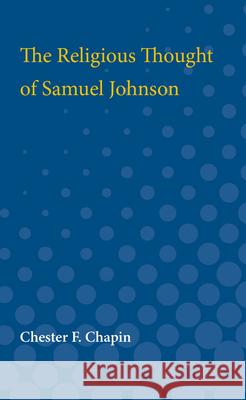The Religious Thought of Samuel Johnson » książka
The Religious Thought of Samuel Johnson
ISBN-13: 9780472750702 / Angielski / Miękka / 1968 / 194 str.
Starting from the youthful influences that helped to form Samuel Johnson's mature religious thought, Chester F. Chapin goes on to consider the development of this thought and its relation to Anglican orthodoxy and to social and political questions. The second and major part of the book is devoted to an analysis of Johnson's mature position on certain basic issues. Chapin considers Johnson's attitude toward evidences, arguing that Johnson attempted to establish revelation by grounding it in history. He maintains that Johnson did not distinguish between Christian and non-Christian ethics, and that it was the eschatology of Christianity that he valued particularly. The intensity of Johnson's fear of death and judgment is a measure of the intensity of his faith. Chapin considers problems of evil, of free will, and of foreknowledge and necessity as Johnson struggled with them. Writers that Johnson referred to argued that foreknowledge does not imply necessity, but Chapin maintains that Johnson was not convinced by these arguments. Experience, Johnson saw, was on the side of free will, and for him this took precedence over theory. The author then turns to Johnson's social and political attitudes. His loyalty to the Church shaped other conservative attitudes. Johnson did not assert that the ultimate conversion of all men to Christianity was part of God's plan, and his attitude toward the non-Christian world approached that of live and let live. Johnson was not a relativist. Since men have the ability to distinguish good from evil, it follows that there is an objective moral order in the world. Finally, Chapin reviews the problem of human life, which so occupied Johnson's mind, and states that for Johnson religion was the only rational solution to this problem. Chapin also presents the position of Hume and other 18th-century intellectuals and provides a carefully reasoned argument concerning various questions of theology.











